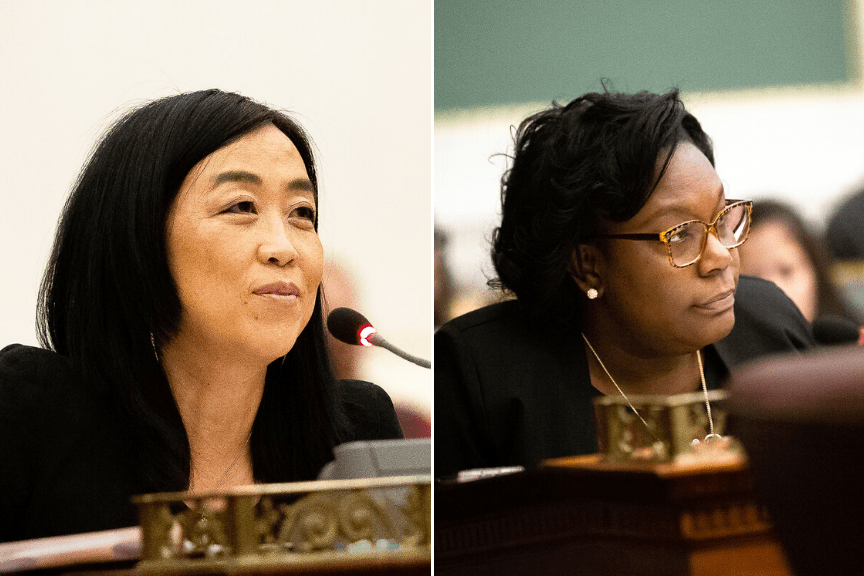Gym’s resolution calls for a temporary moratorium on evictions, residential foreclosures, tax liens on residential properties, and utility shut-offs and Brooks’ resolution calls for protections of workers in the service and healthcare industries
PHILADELPHIA—Thursday, March 12, City Councilmembers Kendra Brooks (At-Large) and Helen Gym (At-Large) introduced two resolutions urging the City to protect Philadelphia’s most vulnerable populations in the likelihood of a COVID-19 health emergency.
Councilmember Kendra Brooks’ resolution calls on the City to develop an action plan to support and protect service and healthcare workers from the potentially devastating impacts of a COVID-19 coronavirus pandemic.
“Nannies, house cleaners, food service employees, healthcare professionals, janitorial staff, and others are already feeling the impact of this public health crisis,” said Councilmember Brooks. “Not only are service and healthcare workers at a high-risk of contracting the virus because their work requires regular contact with the public, but many can’t afford to have their hours cut or stay home when they are ill. They can’t just work from home.”
Councilmember Brooks’ resolution calls on the City to develop a plan that will ensure protections and support for Philadelphia workers, including, but not limited to, a continuity of health and paid time off benefits for current employees, earmarking funds for emergency cash grants, extending paid sick day laws, and clarification from the Mayor’s Office of Labor asserting the rights of workers and enforcement of complaints.
Councilmember Gym’s resolution calls for responsible agencies to protect residents at risk of eviction or foreclosure and/or at risk of having essential utilities cut off in the event of sudden income loss as a result of work stoppages, illness, and possible quarantine. It calls on the Philadelphia Sheriff’s Office, the First Judicial District of Pennsylvania, and area utility companies to explore temporary moratoriums on evictions, residential foreclosures, tax liens on residential properties, and utility shut-offs.
“In a public health emergency, we are only as healthy as those most vulnerable, least economically secure, and least covered by our social services,” said Councilmember Gym. “We must do all we can to keep people secure enough to take care of themselves and endure a quarantine or treatment if required. That’s why we’re calling for efforts that keep people in stable housing in the event of a public health emergency.”
The Philadelphia Sheriff’s office supports exploring the moratorium on mortgage foreclosures, evictions, and tax liens which fall under the Sheriff’s jurisdiction.
“The Sheriff’s Office supports a thoughtful exploration of this moratorium as it is clear the potential hardship posed to our residents would be severe to those who are already in the midst of one of life’s most traumatic moments — losing their homes,” said Sheriff Rochelle Bilal. “It is essential that when we come to a solution, we go into this effort together for the betterment of our communities.”
Councilmember Gym’s resolution is co-sponsored by Councilmembers Brooks (At-Large), Jamie Gauthier (3rd District), Katherine Gilmore Richardson (At-Large), Bobby Henon (6th District), Kenyatta Johnson (2nd District), Maria Quiñones Sánchez (7th District), and Isaiah Thomas (At-Large).
Councilmember Brooks’ resolution is co-sponsored by Councilmembers Gym (At-Large), Jamie Gauthier (3rd District), Katherine Gilmore Richardson (At-Large), Isaiah Thomas (At-Large), and Derek Green (At-Large).
According to a recent survey conducted by One Pennsylvania and Make the Road Pennsylvania, over 26% of workers say that their employers had refused to let them take a day off when they were sick in the past four years, and over a fifth of respondents reported that their employers have retaliated against or threatened them for taking a day off because they were sick.
“As a high risk person with autoimmune issues working in a service job, I come in contact with people constantly,” said Madison Nardy, an employee at the Philadelphia International Airport and leader with One PA. “Our jobs are still forcing some of us to come in when we are sick. They are not giving us more sick time during this crisis. If we are quarantined, our jobs need to be protected and safe when we come back.” Leaders from the Domestic Workers Alliance-PA also commented that the hard-won protections, including paid time off, that workers would have under the Philadelphia Domestic Workers Bill of Rights, do not go into effect until May.
“As the virus spreads and cancellations halt business in our airports, stadiums and hotels, we must ensure that service industry workers have the training, staffing, healthcare and paid time off to properly protect themselves and the public from the virus,” stated Rosslyn Wuchinich, President of UNITE HERE Local 274. “If we do not take action now, the people who are already at the frontlines of this crisis will be in tremendous physical and financial danger.”
Matthew Yarnell, President of SEIU Healthcare Pennsylvania which represents 45,000 healthcare workers and caregivers across the state, expressed strong support for the resolutions: “We live in a broken society where too many working people are often forced to make the impossible decision of paying for life-saving medications, paying their bills, or paying their rent. We applaud these resolutions, which put the health of working people and the entire community first and foremost.”
“Unless the City takes a stand, I fear that we will begin to see a division between those who can afford to stay healthy, and those who become sick because of their circumstances,” said Councilmember Brooks. “We are calling on the City to take immediate action and prioritize the health and wellbeing of Philadelphia families.”
“When we stand together as a city to protect the health and well-being of our most vulnerable neighbors, we are all safer for it,” said Councilmember Gym. “The federal government’s failure to respond appropriately means that local governments must lead an efficient and bold response to protect the safety of all residents as well as the public health.”
###


